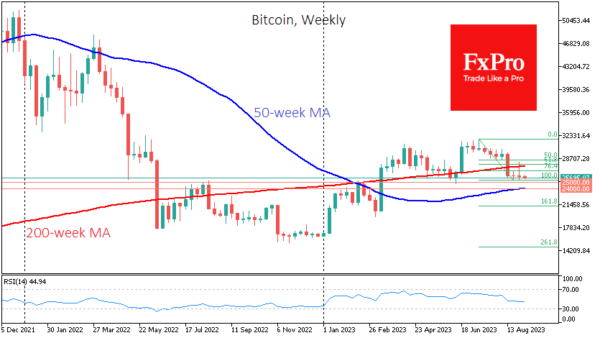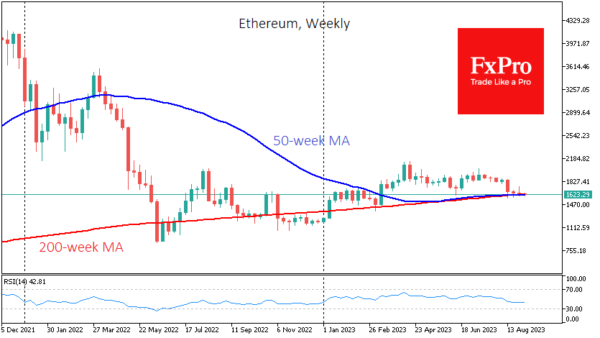Market picture
The crypto market capitalisation declined by 0.66% to $1.038 trillion, showing several waves of decline with increasingly lower local lows. This is a sure sign that the bears are in control, and the pressure seems to be coming from the stock market, as the institutional favourites that are losing the most so far are Bitcoin (-1.1%), Ethereum (-0.9%) and XRP (-0.7%).
The first cryptocurrency is settling increasingly firmly in the territory below $26K. Since March, Bitcoin has been repeatedly bought on dips to this level, but it seems the support doesn’t look as strong now. A failure under $25.4K would signal the end of the corrective rebound to $28K and open the way to $21.5K. However, potentially strong support could come as early as $24K, where the 50-week moving average passes.
Ethereum has already intertwined the 50 and 200-week MAs and has regularly received support on dips under them over the past four weeks. It’s an open question how durable that support will be. It’s worth being prepared that a consolidation under $1600 would trigger a deeper sell-off.
News background
According to CoinShares, investment in crypto funds fell by $11 million last week; outflows have been down for 6 of the previous seven weeks. At the same time, trading volumes were 90% above average since the beginning of the year.
According to IntoTheBlock, crypto whales have invested more than $1.5bn in Bitcoin in the past two weeks, with purchases following BTC’s sharp drop in mid-August.
After the court ruling in the Grayscale case, the SEC has no choice but to approve applications to launch spot bitcoin-ETFs, JP Morgan believes. At the same time, the regulator may approve several applications at once. But that takes time to prepare, so the SEC postponed its decision until October.
The activity of a wallet linked to the bankrupt FTX exchange has raised fears of a potential cryptocurrency sell-off in the making. On 24 August, FTX announced plans to “sell, stack and hedge” $3 billion worth of its cryptocurrencies.


